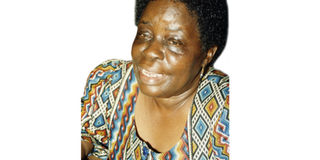Joyce Mpanga: A quiet champion for women’s rights

Ms Joyce Mpanga. Courtesy Photo.
What you need to know:
Her life story is one of successfully upending assumptions about women, in ways that are noteworthy for Uganda, writes Brian Magoba.
Considering her achievements, both personal and national, one wonders why Joyce Mpanga and the world she inhabits ever lamented her being born a woman. “From the very beginning, socialisation tells me it is a pity I was born a woman,” she told spoke.com.
She was echoing sentiments once expressed by her grandfather, Gabriel Sserunyiigo, who said her gender could be a hindrance as she applied her intelligence. Her life story is one of successfully upending these assumptions, in ways that are noteworthy for Uganda.
For instance, she contributed to efforts to formulate a gender-sensitive constitution that protected women, allowed them greater and more direct participation in Uganda’s political processes, and revised the laws to allow Ugandans to define their citizenship by their mothers.
One result of such collective efforts was Uganda celebrating its first International Women’s Day in 1985. Consider that Uganda’s Gender Inequality Index ranked 116th out of 146 countries in the Social Institutions and Gender Index’s Human Development Report of 2011 and you then appreciate the significance of feminists like her.
Her hands-on approach to effecting positive change, an increasingly rare thing even for those not born into privilege like she was, is another reason Ugandan history will celebrate her. Her father, Atanasio Ssewannyana Masembe, was a Buganda loyalist in charge of the Mengo Palace, and her husband organised Sir Edward Muteesa’s passage to exile in 1966.
How she raised her family testifies to this. Exiled in London in 1966, at home, she maintained Kiganda culture so that her daughter, Lydia, could learn tradition. Yet, as an English teacher at a primary school in England, she could have chosen to alienate herself totally from her culture and raise a child deficient in their mother-tongue and its attendant culture.
Her consistency with such patriotic causes, her example of not delegating parenthood to a maid just because she could, and her exemplary interpretation of emancipation as making for better women instead of transforming them into men, is why she is listed in the 2012 Who is Who Book Of Records.
Factfile:
Born 1934
Attended Gayaza High School
B.A. in History from the UK
Master of Science in Education from Indiana University, Bloomington
Chair, Uganda Council of Women (1986-1988), Women MP, Mubende District (1996-2001)
Minister of State for Women and Development (1987), Minister of State for Primary Education (1989 to 1992).




